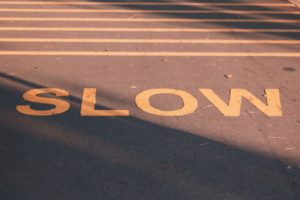How to Work From Home Effectively
Reading Time: 7 minutes This post contains affiliate links. If you use the links to make a purchase, I may receive a small commission, at no additional cost to
The most dangerous question to ask yourself is this: Am I doing this right?
Variations of this question look like: What am I supposed to be doing right now? What should I be doing right now?
What this looks like in practice is a whole lot of second-guessing. And not even in important, measure-twice-cut-once scenarios. It crops up in the most innocuous circumstances when the answer is irrelevant because there is not right answer.
You can’t do something right if there is no “right” way to do it.
And you can’t do something “better” unless you have a point of reference. What are you trying to be better than? Do you even know?
You can see how quickly this question crumbles when you look at it logically, but in the moment, it can rule your behavior and trigger anxiety.

I recently encountered this on an airplane, and it was ridiculous.
I was sitting there with my book. My carryon was stowed wheels-out in the overhead bin, my personal item was tucked neatly beneath the seat in front of me, and my teddy jacket was tucked around me within the confines of my seat.
And I heard it.
I heard the question pop into my head, Am I doing this right?
It took me a second to figure out what I was really asking. Unsurprisingly, it wasn’t about whether I was in full compliance with TSA guidelines.
Was I out of everyone’s way? Was there a more efficient way I could have packed? Should I be doing something other than reading on this plane? Was there a better use of my one-hour flight time? Should I be offering to help her with that lady’s bag when we deplane? Could I have dressed better for this flight? Should I have peed first? Would I look like a more experienced traveler if I had a Starbucks and an e-reader?
A litany of questions riddled with should and its synonyms. As much as I abhor the word, it’s shameful to admit how often it appears in my internal monologue, a threat as real as a loaded gun.
Answer correctly or be judged, cast out, a disappointment.
Answer wrong and prove to yourself that you’ve failed even at this simple task.
You become hyper-critical, seeking out all the ways you’re going to fail, when the truth is that you can’t fail because there is no one way of doing the thing that guarantees successful execution. Because success is subjective, and you’d have to know to begin with what you’re trying to achieve. And that presupposes that what you’re trying to achieve is even measurable in a tangible way.
For instance, if my goal was to look like a fashionable traveler, does that mean a fashionable business traveler? Fashionable by IG “blogger” standards in a topknot and dad shoes? Luxury fashionable, where if you don’t have something Dior you needn’t bother playing? Or just fashionable as in I showered today?
You can see how quickly this becomes a ridiculous exercise.
But you don’t see any of that in the moment. You ask yourself, Am I doing this right? And you get caught in a tailspin of self-doubt. Once that’s all you can see, it’s all that matters, and you lose sight of the fact that there is no right answer, casting about frantically for something that doesn’t exist to set you free in the land of self-assurance.
Self-assurance. Assurance. Defined as, a positive declaration intended to give confidence; a promise.
It’s a funny thing to me that we are expected to be able to generate our own assurances by the time we reach adulthood. Most of our upbringing is structured around earning confidence through achievements that only count if they’re recognized by a greater collective.
You earn confidence in sports by becoming the athlete that’s recognized and cheered for. In theatre, by landing leading roles. Your confidence grows in music, art, or research after you’ve been told you’ve received accolades for having performed, executed, or reported well.
I know there are students out there who by nature seem to believe in their own abilities, however off-base that belief might be when compared to the reality. But we are encouraged to have enough self-awareness to know if we aren’t going to be the next singing sensation or NFL quarterback. And no one likes the guy or girl who is a legend in their own mind without the chops to back it up in the real world. It stops being cute somewhere around puberty.
And yet, less than a decade later, we’re supposed to enter the working world full of our own confidence when no one else is filling that bucket for us anymore, and no one bothered teaching us how to do it ourselves.
It’s no different than indulging your children into adulthood and then wondering why they don’t know how to support themselves, or enabling an addict and then wondering why they flounder when you leave them to their own devices. These are both things that most of us are ready to identify and judge in the lives of others, but we struggle to see how it parallels our own crisis of self-confidence.
Circling back, it seems clear to me that we are raised to always ask whether we’re doing the thing right and to look for outside confirmation that we are. Without it, all we know is that we’ve fallen somewhere between useless and mediocre, and we either have to accept that status or continue striving for someone, some ethereal collective conscious, to affirm that we’ve gotten it right.
How do we break this cycle?
How do we thoroughly convince ourselves that there is no right way, and that the way we choose for ourselves is incontrovertibly the right way, regardless of what others are saying or doing?
And more importantly, how do we come to believe in ourselves in a lasting way? Affirmations on post-its around the house, daily meditation, and journaling are all well and good, and I believe all of those things have a place. But should our feelings of self-assurance be so fragile that if the post-it falls or you don’t have time for meditating, it crumbles?
How do we go about truly internalizing the belief that we’re doing it right simply by doing it for ourselves, and not for others?
I don’t have the answers. I will continue with my daily journaling. But my hope for all of us is that the day comes that we wake up radiating the positive beliefs about ourselves, absolutely self-assured that we’re doing it right.
Reading Time: 7 minutes This post contains affiliate links. If you use the links to make a purchase, I may receive a small commission, at no additional cost to

Reading Time: 7 minutes This post contains affiliate links. If you use the links to make a purchase, I may receive a small commission, at no additional cost to

Reading Time: 7 minutes I learned a big lesson in chronic stress and slowing down last week. I talked in my last post about acknowledging my chronic stress as